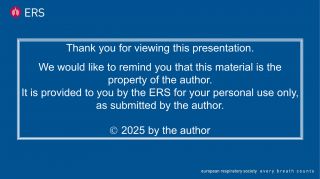23 January, 2025 | Online
17:00-18:00 CET
Chair: Prof. Andreas Von Leupoldt (Leuven, Belgium)
Speakers: Dr Eleonora Volpato (Milano, Italy), Dr Karen Heslop-Marshall (Newcastle upon Tyne, United Kingdom), Dr Ingeborg Farver-Vestergaard (Vejle, Denmark)
Fees: Free for ERS members / €10 for non-members
Find out more about becoming a member
Overview
Chronic obstructive pulmonary disease (COPD) is a common respiratory condition and patients often experience symptoms of anxiety and depression. However, management of psychological distress in practice is often poor.
Clinicians may find it difficult to both recognise distress related to COPD and know what interventions are most appropriate to refer individuals to. This session will address these important issues supported by the most-up-to-date literature and evidence reviews.
Educational aims
- The audience will gain more understanding of how to recognise psychological distress in COPD patients as well as guidance on how this should be managed.
- They will receive input on the current evidence base around interventions in the area as well as what recommendations are for future research.
Topics
This webinar will focus on psychological distress in COPD (including depression and anxiety):
- What is this, how common is it?
- What does the evidence base tell us about managing distress in COPD?
- What screening tools can we use to detect psychological distress?
- What interventions might be suitable to offer patients?
- When should I refer to further specialists?
Target audience
Any individual who works either clinically or academically is likely to find this webinar interesting and of benefit. In particular, we anticipate that practitioners within primary care and secondary respiratory care will find this beneficial.
Format
This webinar includes three presentations (10-15 minutes each) followed by a facilitated question and discussion session (15-20 minutes). The chair and discussant of the session is Prof. Andreas Von Leupoldt. The presentations are as follows:
- What is psychological distress in COPD and why is it important - Eleonora Volpato
- Recognising distress in the clinic situation - Karen Heslop-Marshall
- Managing distress - state of the evidence and recommendations for practice - Ingeborg Farver Vestergaard
In addition to the discussion session, there will be opportunities for interaction during the presentations using Poll Everywhere.
Learning outcomes
Following this webinar, participants will be able to:
- Recognise the significant burden of psychological distress in COPD, including impacts on self-management and health outcomes
- Identify distress in people with COPD, using validated tools
- Propose evidence-based strategies to manage distress in COPD
CME credit
An application for accreditation of this webinar has been made to the European Board for Accreditation in Pneumology (EBAP) for 1 CME credit per 1-hour attendance. If accredited, the CME credit will be granted upon attendance of at least 60 minutes during the live webinar only.
What is a webinar?
A webinar closely simulates a lecture-based teaching experience. The speaker can interact with the audience, just as in a classroom setting. During the webinar, you will be asked to share your opinion on issues related to the topic using interactive polls.
All participants will be able to hear the lecturer and see the slides throughout the presentation. As a participant you will be able to pose questions or discuss ideas with the other participants via the text chat facility and the speaker will respond to the questions via the microphone.
Login guidelines
More information will be communicated in due course.
- Please log in to the webinar 20 minutes before it is scheduled to commence. If you have any technical difficulties whilst trying to log in or during the session please contact e-learning@ersnet.org.
- Check Central European Time.
- To achieve the best quality, we recommend to avoid downloading anything from the internet during your connection to the lecture and stopping all other programmes.
- Please also ensure that your audio settings are not set to mute and adjust the volume to a comfortable level.

